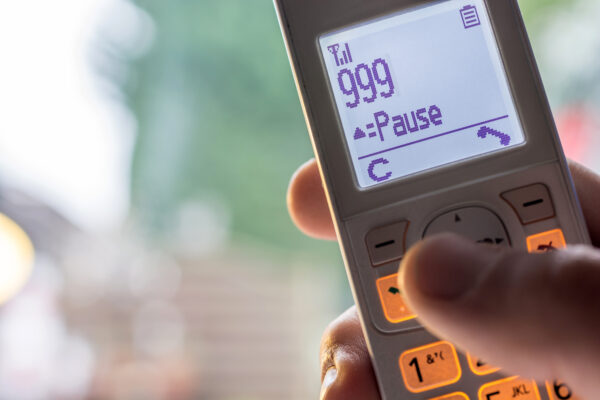Hearing loss & safety

When you or a loved one live with a hearing loss, it is natural that your personal safety is a concern.
Fortunately there are services and support available to help you when at home, or out and about.
Our handy guide below identifies the different ways of accessing emergency help when its needed.
Emergency SMS
Register for 999 text messaging
Would you find it difficult to hear on the phone if you had to call the emergency services?
The emergency SMS service allows deaf, hard of hearing and speech-impaired people in the UK to send an SMS text message to the UK 999 service. This will then be passed to the police, ambulance, fire rescue, or coastguard – whichever emergency service is required.
To use, send an SMS message to 999 to call for help and the emergency services will reply to you.
It is important to register your phone for 999 text messaging before us – it only takes 10 seconds! Visit: emergencysms.org.uk/ for more information.
999 BSL
British Sign Language users requiring emergency assistance can contact fire, police, ambulance and coastguard emergency services using the service 999 BSL.
The service is easy to use, users click one button to call 999 via an interpreter. All calls are free and available 24/7.
You can download the 999 BSL app in iOS or Android devices or use the 999 BSL website.
NHS 111
If you need urgent medical help, but you’re not sure where to go, use 111 to get assessed and directed to the right place for you. Call, go online or use the NHS App.
This service can be accessed by using Relay UK communication support by calling 18001 111. If you are a BSL user, you can the interpreter service at 111.nhs.uk.
Watch the video below for more details:
ICE – In case of Emergency: A simple idea that could save your life
We all carry our mobile phones with names and numbers stored in its memory but nobody, other than ourselves, knows which of these numbers belong to our closest family or friends.
If we were to be involved in an accident or were taken ill, the people attending us would have our mobile phone but wouldn’t know who to call. Yes, there are hundreds of numbers stored but which one is the contact person in case of an emergency? Hence the ‘ICE’ (In Case of Emergency) Campaign.
The concept of ‘ICE’ is catching on quickly. It is a method of contact during emergency situations. As cell phones are carried by the majority of the population, all you need to do is store the number of a contact person or persons who should be contacted during emergency under the name ‘ICE’ (In Case Of Emergency).
The idea was thought up by a paramedic who found that when he went to the scenes of accidents, there were always mobile phones with patients, but they didn’t know which number to call. He therefore thought that it would be a good idea if there was a nationally recognised name for this purpose.
In an emergency situation, Emergency Service personnel and hospital staff would be able to quickly contact the right person by simply dialling the number you have stored as ‘ICE.’ For more than one contact name simply enter ICE1, ICE2 and ICE3 etc.
Deaf messaging service (DMS)
Informing people when the fire alarm sounds in public places
DMS helps service providers and employers comply with the Equality Act 2010 and allows deaf and hard of hearing people freedom to move around buildings without the worry of missing an emergency situation.
When a deaf or hard of hearing person enters a building where DMS is installed, they will see clear signage asking them to text a location code to the DMS number. Once a connection text has been sent, the person will be connected to DMS for that location. After 12 months they will receive a text asking them to reconnect, connection text costs the same as a standard SMS text.
When the fire alarm sounds, the DMS controller which is hardwired into the fire alarm panel, will trigger a process that within seconds sends a text message to all the people connected to that location. More about DMS.
Webpage updated: December 2023